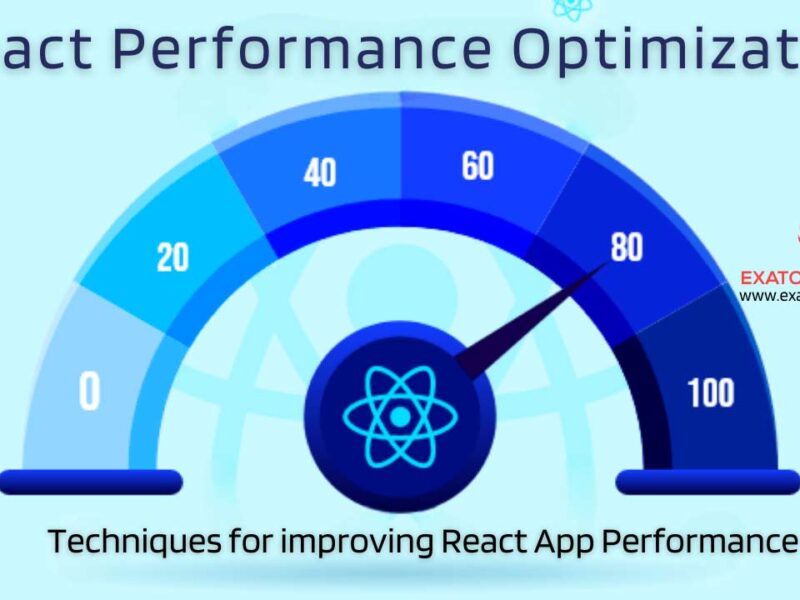Mobile apps have been influential in this sudden transition towards automation that continues to envelop the planet. But the steady rise in smartphone adoption has brought IT businesses some new challenges. Originally, the main goal was to benefit a business from the digital transformation, and the emphasis was on satisfying the needs of the market and DevOps In Mobile App Development.
Mobile applications have become a need of the hour in this modern age. But the rising competition has drawn companies into some unwanted challenges. Development cost, security, code quality, maintainability, flexibility, and scalability were the fundamental things that a developer wanted to consider when building an app. The vision was to ensure fast delivery at a reduced cost.
This is where DevOps comes to their rescue. Given today’s mobile-first approach, DevOps was created with the intention of providing the industry with a seamless solution that makes building an app easier and more affordable.
And today, DevOps is ruling the mobile application market. But what is the role of DevOps in mobile app development? Read on to get the complete description.
What is DevOps?
Before we understand the role of DevOps, let’s figure out what DevOps exactly is. DevOps is an innovative combination of software that facilitates smooth interaction in the entire ecosystem of application development.
The solution is designed to improve collaboration between the parties involved in the overall work culture of application development. From the development to the operational staff, every person involved in the project would be brought into a centralized ecosystem by DevOps.
By bridging the interaction gap between app developers and the operational team, DevOps aims to eliminate all the challenges that become an obstruction in the delivery of the software.
In a nutshell, DevOps for web developers fosters a standardized work culture that promotes collaboration between teams. Everyone involved in the DevOps application environment will be integrated in some way through automation.
As a result, it has become easier for businesses to align their goals with real-time operations. People also call DevOps an exclusive source for developers that boost business productivity.
The use of DevOps is now enabling smooth transitions between activities; developers can now launch software more reliably, quicker, and exactly as it was intended.
This must clear your doubt what DevOps is, and how it is linked with application development. DevOps developers introduce processes and methodologies in DevOps in a way that adapts to the application development requirement.
Mobile DevOps, or mobile app development, is popular among developers just for this reason alone. But as you have learned everything you wanted in response to what is a DevOps, let’s figure it out.
Major Roles of DevOps in Mobile Applications
Below we have broken down the roles of DevOps in the mobile application. It will help you find a clear and detailed response to what is the role of DevOps across enterprise software development. Take a look now.
1. Increased communication
Smooth interaction is what keeps people interested in the overall facilities and solutions provided by DevOps. The group of tools brings people involved in the development job and the operation job under one roof. As a result, communication flows smoothly between everyone involved in making a vision for an app a reality.
Error-free and fast communication is a requirement of new-age businesses. Traditionally, the task was downright challenging, especially when more than one person is involved in the production phase. But with the launch of DevOps applications, all those hassles have been eliminated from the equation. The automated software can run continuous testing and send feedback in real-time, unlike the traditional process of development, in which you had to rely more on the customer’s feedback.
In other words, not only will you be interacting faster with other people in the development process, but you will also be interacting more effectively with your own coding work in real time. If you are also a developer, you should start using DevOps for mobile apps.
2. Efficient Utilisation of Resources
Unlike traditional approaches, automation is the hero of DevOps. The developer makes efficient use of resources and space in real time. No matter if you are using iOS DevOps or Android DevOps, you will access almost every resource in exactly the way that matches a developer’s comfort level.
From code management to development platforms, all tools are within reach. Even if you want to run a quick test to verify the response of a particular code, take advantage of testing tools. DevOps provides all of these amazing features to developers, which can sometimes lead to a heavy reliance on the automation that you see in every development task. Still, it impresses you in most instances.
The role of DevOps isn’t just limited to resource accessibility. If you wish to automate the development processes under the condition of not run into a confusing situation, don’t worry. Only optimal resources are available for your help. DevOps application development aims to accelerate application production. Therefore, you will be getting most activities accomplished in a streamlined environment.
3. Eliminating Errors From the Equation
The core operation of DevOps with respect to application development is saving precious time of developers. And it’s no surprise that it’s after the development phase. Usually, developers have no other immediate alternative to running a quick inspection of their app. They had no choice but to solicit feedback from others in order to test the app’s responsiveness and weaknesses. This step alone took a significant amount of time in mobile app development.
Not only did developers need to collect public feedback, but they also needed to test the application on various operating systems. Such as, for a few hours, they would have it tested on iOS, and the next hour on Android, Windows, etc. The task was done regularly and repeatedly. Without a doubt, traditional techniques could have taken this long because the application was manually tested the majority of the time.
But with DevOps mobile apps, pass through continuous testing and monitoring in real time. The tools within the development environment share real-time feedback thanks to the automated testing processes and procedures. It helps in the early detection of threats or bugs in the application’s code. The assigned mobile app development team roles then configure the issue and resolve it at the same time.
4. Boosting Product Quality
Don’t take it wrong. DevOps was never intended to make the development process faster while lowering quality. Instead, DevOps utilizes a well-balanced approach, with the support of which the software gains the capability of delivering instant results while still living up to the expectations of clients and users.
The DevOps process integrates quality into the development process. A developer will be commencing software development with the assurance that they will not encounter unwelcome challenges. This enables them to focus exclusively on delivering a quality-built mobile app because tackling errors and challenges is easier with DevOps.
A focus on security also ensures that the designing and development stages have less room for security adjustments later on. This eventually saves the time of developers, freeing them from all the headaches associated with security concerns later on. However, DevOps implementation doesn’t guarantee safety from all internet threats. Even if an error or issue arises, who is responsible for the fault? There will be clear visibility of the matter. This will ensure faster maintenance of the product.
5. Stability of the Work Environment
One of the biggest benefits harnessed by application developers on DevOps apps is stability. Because all actions take place in a centralized environment, with all tools streamlining operation handling for developers, the work environment is more stable. It is one of the most basic requirements of a mobile application. Everything you need to regularly integrate new features must be available in a stable environment where data backup and autosave features can assist a developer in making a quick start from where they left off previously.
Traditionally, the job would require a lot of dedicated effort. However, with the adoption of DevOps in the workplace, developers now have access to transparency throughout the processes. In other words, the development team would be aware of which features the QA team is testing and which functions the operational team frequently employs. That’s how the DevOps process creates stability in a work environment. It builds a strong foundation of trust and responsiveness between DevOps and developers.
6. Increase Deployment Success Rates
Programming errors were supposed to be the biggest stumbling block in the developer’s journey. But DevOps for web development and app development, respectively, tackle this challenge with automation. So far, the application’s overall success has been clouded by uncertainty, as it is unclear whether a specific feature of the app is functioning properly or whether it is effectively handling its massive user base. If the application isn’t providing a positive experience to the customers, the only way a developer could make a decision was through feedback.
But through DevOps’ early assessments and real-time feedback, such troubles are detected earlier. As a result, deployment success rates are relatively higher. The frequent release of code with the DevOps approach ensures early detection of all problems that could later translate into a bad user experience on the app. DevOps roles come into play when application deployment is urgent and there’s no other alternative to managing app development team roles. But how the implementation happens, figuring it out next.
DevOps Adoption and Implementation: From Application to Enterprise
How do you implement mobile DevOps?
Let’s say you’ve chosen to use mobile DevOps. The three steps you need to follow are as follows:
Continuously delivering integration
There’s no room for errors or silly mistakes. Developers must complete all of their homework because it is a prerequisite for writing code. Going forward, you will have to learn to integrate most things on your own. Keep in mind that Mobile DevOps workflows do not include a fully-built solution.
The majority of the features will have to be designed. But since DevOps allows a group of teams to write code in an integrated environment, it becomes easier for another team to detect the code and thereby bring it into use. Still, it is vital for the development teams to ensure that all assets used in the development are traceable, so whether it is the text files, configurations, script documents, or code, every needed detail should be available without issue. Come up with the DevOps’ implementation plan to do justice to your creation and avoid malfunctions.
With the term “continuous delivery integration,” we mean a quick response to the task while making sure that all projects are delivered continuously without a stop. The consideration makes it certain that the software or app is performing as smoothly and quickly as possible once it is ready for deployment.
Monitoring and testing
Like your traditional work culture for application development, monitoring and testing will keep consuming your time in DevOps. But luckily, it is not that annoying. With many variables, it is easy to check what exactly is impacting the performance of a mobile application. However, these variables can be in multiples as they can include a vast array of metrics and sub-metrics to be used within the application.
To summarise a use case, while developing an app, you may be considering the device resolution, functionalities, screen size, capabilities, and other factors. Therefore, testing needs must be properly assessed. It would be best to keep the simulators working in real-time. DevOps provides developers with the functionality of using an automated test process, which makes it easier and faster to manage and identify frequent bugs and errors in the ecosystem.
Lot of factors are linked to failures, such as power, memory, network conditions, etc.. So, all the developers should look to ensure continuous performance monitoring on adding various third-party SDKs such as cash reports for discovering the reasons for the error.
However, it is fairly common in almost every application category that they perform very well in the test environment, but when they are launched into real-world operations, they encounter some unexpected problems. Well, many factors could be backing up the major cause linked with failures; the problem can be in power, memory, or the network, etc.
Therefore, it is recommended that developers keep a crash report on hand at all times so that problem solutions can be found quickly.
Quality Control
In the end, you will be focusing on quality when you implement DevOps. The client is pivotal when you are working for them. The validation of all the major components used or to be used in the application development process must never be compromised at any cost. A disciplined work culture is essential to maintain from the beginning to the end of the program.
Even though DevOps speeds up the application development process and reduces the possibility of errors. Still, it is vital as a DevOps application developer that you carefully check everything. Feedback gathering will remain an imperative for applications built on DevOps.
The automation-based application-building technique just adds precision to the overall application-building and deployment process. Whether the application is serving its purpose or not, the question could be better answered by responses from end users’ feedback. DevOps adoption will not offer you a complete solution.
The Essential 6 Cs of Mobile DevOps
Let’s take a look at the 6 vital Cs which ensure effective implementation of DevOps in mobile app development.
1. Continuous Planning
Every world creation begins with the planning phase. Your extensive time should go into this process. Because, in practice, it will not be a one-time event, but will necessitate ongoing planning. Your planning should incorporate the roles of your team as well. As such, it could be a vital role of the project managers, developers, operations staff, or business analysts. In the end, you will visualize how to implement DevOps in an organization, with all potential opportunities clearly visible.
2. Continuous Integration
The 2nd C calls for a collaborative approach. Since DevOps is primarily designed to encourage a collaborative environment in the application development process, it must be checked that the code created by one team can easily be combined with that of another. The aim is to encourage flawless development. A DevOps implementation strategy can also be tried by everyone involved in the development process.
3. Continuous monitoring
Continuous observation assists in identifying and resolving issues. In order to ensure that the app is reliable, free of bugs, and provides the finest possible experience for users, developers should confirm all the monitors. To make things easier, make sure you keep a record of all coding work.
4. Continuous testing
As you adopt DevOps, ensure that the testing process is a crucial step in the creation of mobile apps. Making minor adjustments first, as opposed to more significant ones later, is a much better consideration. You subsequently save both time and money as a result of this.
5. Continuous Deployment
Every piece of code is put through automated testing before being made available to the production environment. This boosts the development team’s productivity and allows you to respond quickly to market changes. There’s no guarantee that DevOps implementation will be worth it, but it would help you adapt faster to the market, it will be enabling you to evolve with time.
6. Continuous Delivery
Software updates can be made in smaller steps. This will be a continuous delivery. The software’s trustworthiness is not put at risk and the release process is made more effective if proper DevOps implementation steps have been followed.
In Conclusion
On this walkthrough of the identification of the role of DevOps in the app development process, we have identified that there is no such thing as a wholly separate DevOps for the creation of mobile applications so far. DevOps is a modern-age app development strategy that functions for all components and various application development types. However, DevOps adoption for major applications poses some challenges as well. Still, it has multiple, measurable advantages.



